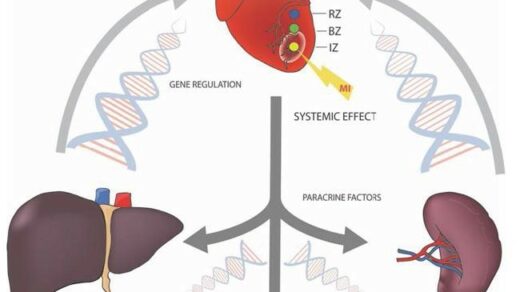In this new study, researchers aimed to determine the genetic predisposition to early breast cancer in women from Kazakhstan.
—
Breast cancer (BC) is one of the most common and deadly cancers worldwide, affecting millions of women every year. However, not all women share the same risk of developing breast cancer. There are many factors that influence this disease, including age, lifestyle, family history, and genetic makeup.
One of the most important aspects of breast cancer research is to identify the genetic factors that predispose some women to develop breast cancer at an early age, especially in different ethnic groups that may have unique genetic variants. This can help to improve the prevention, diagnosis and treatment of breast cancer, as well as to reduce the health disparities among different populations.
In a new study, researchers Gulnur Zhunussova, Nazgul Omarbayeva, Dilyara Kaidarova, Saltanat Abdikerim, Natalya Mit, Ilya Kisselev, Kanagat Yergali, Aigul Zhunussova, Tatyana Goncharova, Aliya Abdrakhmanova, and Leyla Djansugurova from the Institute of Genetics and Physiology, Kazakh Institute of Oncology and Radiology, Al-Farabi Kazakh National University, and Asfendiyarov Kazakh National Medical University aimed to determine the genetic predisposition to early breast cancer in women from Kazakhstan — a population that has not been well studied before. On October 4, 2023, their research paper was published in Oncotarget, entitled, “Determination of genetic predisposition to early breast cancer in women of Kazakh ethnicity.”
“Our study may reveal previously uncharacterized population-specific variants that may increase the risk of BC in the Kazakh population.”
The Study
The researchers enrolled 224 unrelated Kazakh women diagnosed with early onset breast cancer. All patients were treated at the Kazakh Institute of Oncology and Radiology from August 2017 to October 2019. Cohort characteristics reported that the median age of the women was 34.6 years old (ranging between 19 and 40 years), 15.6% were diagnosed under the age of 30 and 13.8% had breast cancer within their family history. The researchers utilized next-generation sequencing (NGS) to perform a comprehensive analysis of germline mutations and gene expression profiles using the MiSeq platform. They used a targeted panel of 94 cancer-associated genes, including a vast number of genes implicated in hereditary cancer syndromes and overall breast cancer predisposition.
“To our knowledge, this is the first study using NGS technology to study the genetic predisposition to early-onset BC women from Kazakhstan and assess their impact on the patients’ clinical outcomes.”
The NGS-based multigene panel testing allowed the researchers to identify recurrent, possible founder and novel PVs in Kazakh women with early-onset BC that were undetected in earlier studies. Among 57 patients (25.4%), 38 unique pathogenic variants (PVs) were identified in 13 different cancer-predisposing genes. Notably, 12 of the 38 PVs were recurrent, including specific variants in BRCA1 and BRCA2 genes, which may represent founder mutations in this population. BRCA1 carriers had a significantly higher likelihood of developing triple-negative breast cancer and having a family history of breast cancer compared to non-carriers. Six of the 38 variants were novel.
“We demonstrated the remarkable efficacy of an NGS-based panel to identify rare germline variants in early onset BC patients. These findings could contribute to the development of population-specific multigene panels for more rapid and cost-effective testing.”
Conclusions
The study provides valuable insights into the genetic predisposition of early breast cancer in women of Kazakh ethnicity. It also highlights the value of next generation sequencing technology and the importance of studying different ethnic groups to understand the diversity and complexity of breast cancer genetics. The authors suggest that broadening the scope of genetic testing for hereditary breast cancer from only BRCA genes to testing multiple genes at once could lead to better results. However, further studies are needed to validate the clinical utility of the panels used in this study. Nonetheless, these findings may aid in developing personalized risk assessment and management strategies for Kazakh women with early-onset breast cancer, as well as to inform future clinical trials and treatments.
“With this in mind, we will focus in the future on segregation analyses of family members and functional analyses to evaluate the inheritance pattern and pathogenicity of the identified recurrent and novel BC variants. Retrospective analyses of their possible association with progression-free, metastasis-free, and overall survival are also an exciting direction for future research. No less interesting would be the study of these variants regarding the chemosensitivity and efficacy of specific targeted therapies for their carriers.”
Click here to read the full research paper in Oncotarget.
—
Oncotarget is an open-access, peer-reviewed journal that has published primarily oncology-focused research papers since 2010. These papers are available to readers (at no cost and free of subscription barriers) in a continuous publishing format at Oncotarget.com. Oncotarget is indexed/archived on MEDLINE / PMC / PubMed.
Click here to subscribe to Oncotarget publication updates.
For media inquiries, please contact media@impactjournals.com.



